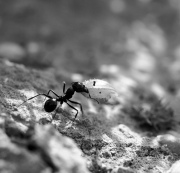Tags
biology, gender, links, performance poetry, poetry, Popular science, science, science and society, Science communication, Science in Society, Species, video, World War Z
 It’s November! That’s not usually an exciting time for me (Helsinki is cold, dark, and wet in November), but this year is an exception. In just under three weeks, I’ll be moving to another continent and starting to write full time! I’m really excited about the change and eager to get started with the next phase of my life…and I’m also very busy with the process of getting there, so Inspiring Science will be more quiet than usual over the next few weeks. Hopefully I’ll manage to find the time to post something, but in the meantime here are some tidbits to tide you over. (If that’s not enough for you, have a gander through some of the old posts or previous linkfests.) As always, feel free to add more links in the comments!
It’s November! That’s not usually an exciting time for me (Helsinki is cold, dark, and wet in November), but this year is an exception. In just under three weeks, I’ll be moving to another continent and starting to write full time! I’m really excited about the change and eager to get started with the next phase of my life…and I’m also very busy with the process of getting there, so Inspiring Science will be more quiet than usual over the next few weeks. Hopefully I’ll manage to find the time to post something, but in the meantime here are some tidbits to tide you over. (If that’s not enough for you, have a gander through some of the old posts or previous linkfests.) As always, feel free to add more links in the comments!
- I’m not quite sure what to make of this: apparently, we tend to choose friends who are genetically similar to us.
- I somehow completely missed the discovery of a new organelle in plant cells which makes tannins (the bitter compounds in tea and wine). Fortunately, Kathleen Raven wrote a wonderful piece about it.
- A report from Nature ME that breast cancer is more aggressive amongst Arab women for some reason.
- Some bats nest in rolled-up leaves that act as megaphones, amplifying calls from other bats.
- Why are there halos around the helicopters in Iraq and Afghanistan?
- This fossilized skull supposedly shows that many of the ancestral human species were actually a single species, but Daniel Curnoe warns about “exaggerated interpretations and hyperbole“.
- “Society, Science, Survival” is an online course timed to coincide with the fourth season of The Walking Dead. Four faculty members from the University of California, Irinve will teach you about everything from social roles and infectious diseases to energy and momentum. (h/t Kyle Hill on But Not Simpler)
- On Language Log, Mark Liberman writes about problems with replication and false positives in how we practice and report science.
- Here’s Michael Eisen’s excellent critique of the recent “sting” operation by Science which supposedly exposing the flaws of Open Access journals.
- Lake Natron in Tanzania is so alkaline that animals which die there turn into amazing salt statues, which Nick Brandt arranges into poses and then photographs.
- Half Drag, by photographer Leland Bobbé, is a wonderful visual exploration of gender fluidity and identity.
- Here’s a wonderful collection of clips showing percussive maintenance, one of the most popular repair techniques known to humans.
- I love poetry and I really wish I could see more performance poetry. Stuff like God is Gay or We Teach Life, Sir or Friend Zone. If you know some good poetry performances, please share them!
That’s all for now!

Two powerful pieces of spoken poetry:
That’s quite a reading list. I’ll be busy trying to read them all. Thanks…I think.
Congrats on your new appointment and good luck with the move.
I’ve finally had a chance to sit down and listen to those and they’re both really good. Thanks for sharing them! And thanks for your congratulations, though I’m not actually starting a new position — I’ll be a full-time freelance writer from now on, with all the freedom and risk that entails! 🙂
Congrats! Godspeed!
Thanks!
best of luck to you!
Thank you!